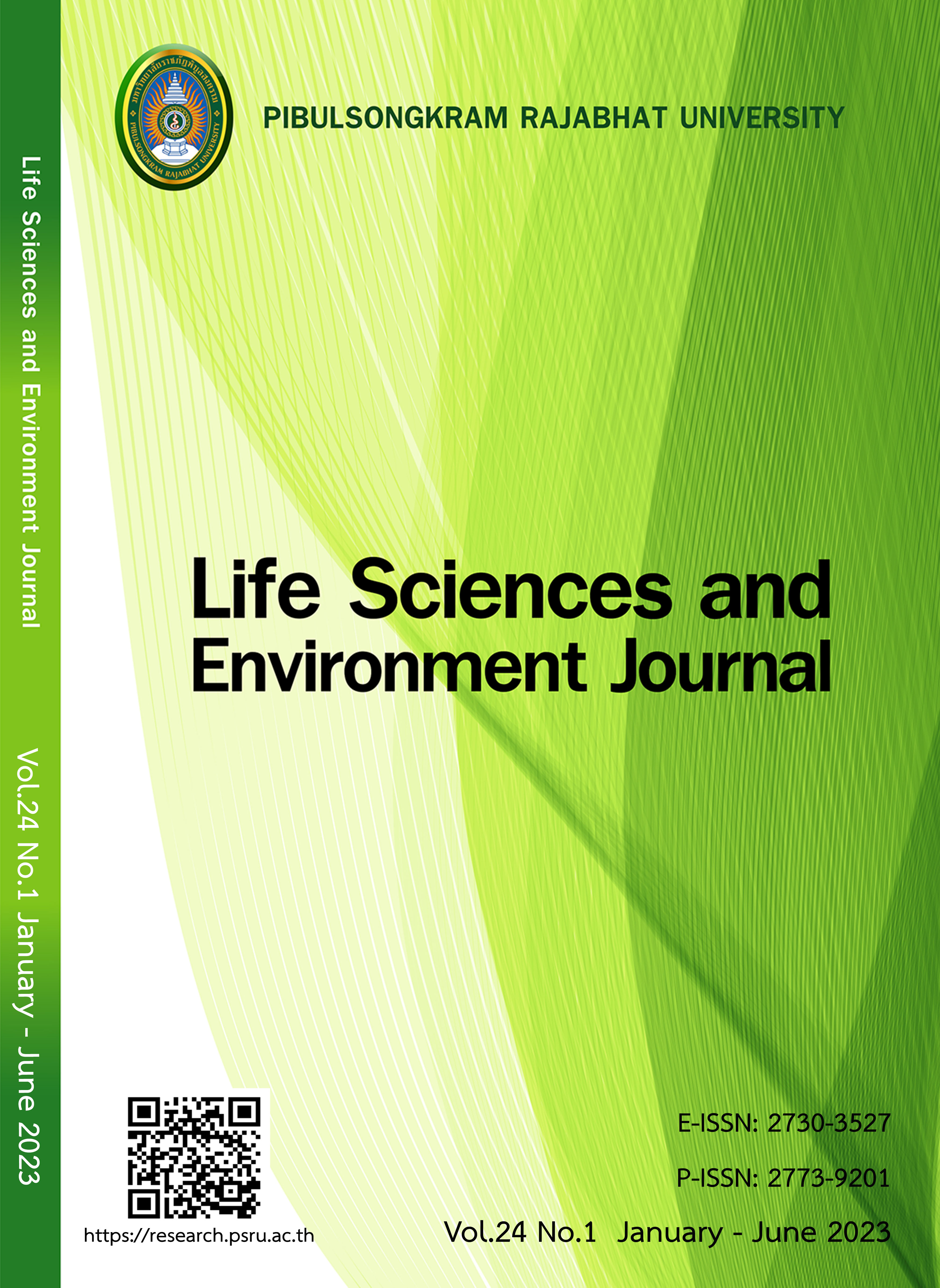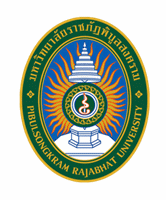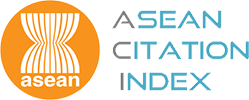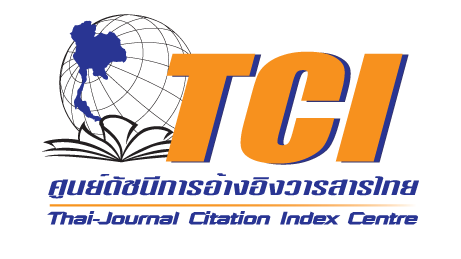ANTICANCER ACTIVITY OF BANANA FLOUR EXTRACTS ON COLORECTAL CANCER CELLS
DOI:
https://doi.org/10.14456/lsej.2023.7Keywords:
Banana flour, Anticancer activity, Apoptosis, Colorectal cancerAbstract
This study was aimed to investigate the anticancer effect of banana flour extracted with different solvents (ethanol, methanol, hexane and water) against colorectal cancer HCT116 and SW480 cell lines. Cell viability and cell death were determined by MTT and trypan blue dye exclusion assay. Apoptosis was investigated by western blot analysis and Hoechst 33342 staining. The results found that ethanolic banana flour extract (eBFE) inhibited cell viability of HCT116 and SW480 greater than other solvent extracts. The eBFE was able to significantly inhibit cell proliferation by dose and time dependent manners. According to the IC50 values, eBFE had a greater anti-proliferative effect on HCT116 than SW480 cells. In addition, eBFE induced cell death and apoptosis by proteolytic activation of caspase-3 and the appearance of chromatin condensation. Collectively, the crude extract of eBFE contains active components that exert growth inhibition in colorectal cancer. This study suggested that banana flour had the potential for cancer prevention and therapy.
References
Abotaleb M, Liskova A, Kubatka P, Büsselberg D. Therapeutic potential of plant phenolic acids in the Treatment of Cancer. Biomolecules 2020;10(2):221.
Ajijolakewu KA, Ayoola AS, Agbabiaka TO, Zakariyah FR, Ahmed NR, Oyedele OJ, et al. A review of the ethnomedicinal, antimicrobial, and phytochemical properties of Musa paradisiaca (plantain). Bulletin of the National Research Centre 2021;45(1):1-17.
Barroso WA, Abreu IC, Ribeiro LS, da Rocha CQ, de Souza HP, de Lima TM. Chemical composition and cytotoxic screening of Musa cavendish green peels extract: Antiproliferative activity by activation of different cellular death types. Toxicology In Vitro 2019;59:179-186.
Blagosklonny MV. Carcinogenesis, cancer therapy and chemoprevention. Cell Death and Differentiation 2005;12(6):592-602.
Dahham SS, Mohamad TA, Tabana YM, Majid AMSA. Antioxidant activities and anticancer screening of extracts from banana fruit (Musa Sapientum). Academic Journal of Cancer Research 2015;8:28-34.
Falcomer AL, Riquette RFR, de Lima BR, Ginani VC, Zandonadi RP. Health benefits of green banana: A systematic review. Nutrients 2019;11:1222.
Galisteo M, Duarte J, Zarzuelo A. Effects of dietary fibers on disturbances clustered in the metabolic syndrome. The Journal of Nutritional Biochemistry 2008;19:71-84.
Gavrilescu LC, Denkers EY. Apoptosis and the balance of homeostatic and pathologic responses to protozoan infection. Infection and Immunity Journal 2003;71(11):6109-6115.
Jeong JB, Lee SH. Protocatechualdehyde possesses anti-cancer activity through downregulating cyclin D1 and HDAC2 in human colorectal cancer cells. Biochemical and Biophysical Research Communications 2013;4;430(1):381-386.
Kahkeshani N, Farzaei F, Fotouhi M, Alavi SS, Bahramsoltani R, Naseri R, et al. Pharmacological effects of gallic acid in health and diseases: A mechanistic review. Iranian Journal of Basic Medical Sciences 2019;22(3):225-237.
Kumar CS, Leuschner C, Urbina M, Ozkaya T, Hormes J. Glutaric acid as a spacer facilitates improved intracellular uptake of LHRH-SPION into human breast cancer cells. International Journal of Nanomedicine 2007;2(2):175-179.
Lee JR, Lee MH, Eo HJ, Park GH, Song HM, Kim MK, et al. The Contribution of activating transcription factor 3 to apoptosis of human colorectal cancer cells by protocatechualdehyde, A naturally occurring phenolic compound. Archives of Biochemistry and Biophysics 2014;564:203-210.
Mathew NS, Negi PS. Traditional uses, phytochemistry and pharmacology of wild banana (Musa acuminata Colla): A review. Journal of Ethnopharmacology 2017;196:124-140.
Nadumane VK, Timsina B. Anti-Cancer potential of banana flower extract: An in vitro study. Bangladesh Journal of Pharmacology 2014;9(4)628-635.
Navarro SD, Mauro MO, Pesarini JR, Ogo FM, Oliveira RJ. Resistant starch: A functional food that prevents DNA damage and chemical carcinogenesis. Genetics and Molecular Research 2015;14:1679-1691.
Parrales A, Iwakuma T. Targeting oncogenic mutant p53 for cancer therapy front oncol 2015;5:288.
Qamar S, Shaikh A. Therapeutic potentials and compositional changes of valuable compounds from banana-A review. Trends in Food Science & Technology 2018;79:1-9.
Rattray N, Charkoftaki G, Rattray Z, Hansen JE, Vasiliou V, Johnson CH. Environmental influences in the etiology of colorectal cancer: the premise of metabolomics. Current Pharmacology Reports 2017;3(3):114-125.
Rawla P, Sunkara T, Barsouk A. Epidemiology of colorectal cancer: incidence, mortality, survival, and risk factors. Przeglad Gastroenterologiczny 2019;14(2):89-103.
Singh B, Singh JP, Kaur A, Singh N. Bioactive compounds in banana and their associated health benefits - A review. Food Chem 2016;206:1-11.
Subramanian AP, Jaganathan SK, Mandal M, Supriyanto E, Muhamad II. Gallic acid induced apoptotic events in HCT-15 colon cancer cells. World Journal of Gastroenterology 2016;22(15):3952-3961.
Vilela C, Santos SAO, Villaverde JJ, Oliveira L, Nunes A, Cordeiro N, et al. Lipophilic phytochemicals from banana fruits of several Musa species. Food Chemistry 2014;162:247-252.
Downloads
Published
How to Cite
Issue
Section
License
Copyright (c) 2023 Life Sciences and Environment Journal

This work is licensed under a Creative Commons Attribution-NonCommercial-NoDerivatives 4.0 International License.
Each article is copyrighted © by its author(s) and is published under license from the author(s).










